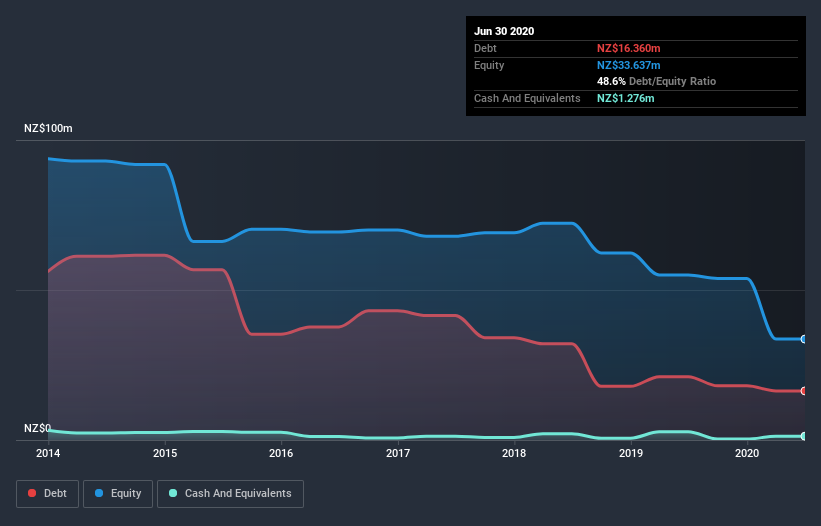Unfortunately for shareholders, when Cavalier Corporation Limited (NZSE:CAV) reported results for the period to June 2020, its auditors, KPMG LLP - Klynveld Peat Marwick Goerdeler, expressed uncertainty about whether it can continue as a going concern. This means that, based on the financial results to that date, the company arguably should raise capital, or otherwise strengthen the balance sheet, as soon as possible.
If the company does have to issue more shares, potential investors will be sure to consider how desperate it is for capital. So it is suddenly extremely important to consider whether the company is taking too much risk on its balance sheet. The big consideration is whether it can repay its debt, since in the worst case scenario, creditors could force the company to bankruptcy.
See our latest analysis for Cavalier
What Is Cavalier's Debt?
As you can see below, Cavalier had NZ$16.4m of debt at June 2020, down from NZ$21.1m a year prior. However, it also had NZ$1.28m in cash, and so its net debt is NZ$15.1m.

How Healthy Is Cavalier's Balance Sheet?
We can see from the most recent balance sheet that Cavalier had liabilities of NZ$32.6m falling due within a year, and liabilities of NZ$3.70m due beyond that. Offsetting these obligations, it had cash of NZ$1.28m as well as receivables valued at NZ$12.3m due within 12 months. So it has liabilities totalling NZ$22.8m more than its cash and near-term receivables, combined.
This is a mountain of leverage relative to its market capitalization of NZ$24.4m. Should its lenders demand that it shore up the balance sheet, shareholders would likely face severe dilution. The balance sheet is clearly the area to focus on when you are analysing debt. But you can't view debt in total isolation; since Cavalier will need earnings to service that debt. So if you're keen to discover more about its earnings, it might be worth checking out this graph of its long term earnings trend.
In the last year Cavalier had a loss before interest and tax, and actually shrunk its revenue by 13%, to NZ$118m. We would much prefer see growth.
Caveat Emptor
Not only did Cavalier's revenue slip over the last twelve months, but it also produced negative earnings before interest and tax (EBIT). Indeed, it lost NZ$2.1m at the EBIT level. When we look at that and recall the liabilities on its balance sheet, relative to cash, it seems unwise to us for the company to have any debt. Quite frankly we think the balance sheet is far from match-fit, although it could be improved with time. For example, we would not want to see a repeat of last year's loss of NZ$21m. So in short it's a really risky stock. We're too cautious to want to invest in a company after an auditor has expressed doubts about its ability to continue as a going concern. That's because we find it more comfortable to invest in companies that always keep the balance sheet reasonably strong. When analysing debt levels, the balance sheet is the obvious place to start. However, not all investment risk resides within the balance sheet - far from it. To that end, you should learn about the 2 warning signs we've spotted with Cavalier (including 1 which is makes us a bit uncomfortable) .
If, after all that, you're more interested in a fast growing company with a rock-solid balance sheet, then check out our list of net cash growth stocks without delay.
When trading Cavalier or any other investment, use the platform considered by many to be the Professional's Gateway to the Worlds Market, Interactive Brokers. You get the lowest-cost* trading on stocks, options, futures, forex, bonds and funds worldwide from a single integrated account. Promoted
Valuation is complex, but we're here to simplify it.
Discover if Bremworth might be undervalued or overvalued with our detailed analysis, featuring fair value estimates, potential risks, dividends, insider trades, and its financial condition.
Access Free AnalysisThis article by Simply Wall St is general in nature. It does not constitute a recommendation to buy or sell any stock, and does not take account of your objectives, or your financial situation. We aim to bring you long-term focused analysis driven by fundamental data. Note that our analysis may not factor in the latest price-sensitive company announcements or qualitative material. Simply Wall St has no position in any stocks mentioned.
*Interactive Brokers Rated Lowest Cost Broker by StockBrokers.com Annual Online Review 2020
Have feedback on this article? Concerned about the content? Get in touch with us directly. Alternatively, email editorial-team@simplywallst.com.
About NZSE:BRW
Bremworth
Engages in the manufacture and sale of carpets and rugs in New Zealand, Australia, the United States, Canada, and internationally.
Flawless balance sheet with solid track record.
Market Insights
Community Narratives


Recently Updated Narratives


Alphabet: The Under-appreciated Compounder Hiding in Plain Sight


MINISO's fair value is projected at 26.69 with an anticipated PE ratio shift of 20x


The Quiet Giant That Became AI’s Power Grid
Popular Narratives


The company that turned a verb into a global necessity and basically runs the modern internet, digital ads, smartphones, maps, and AI.


MicroVision will explode future revenue by 380.37% with a vision towards success



